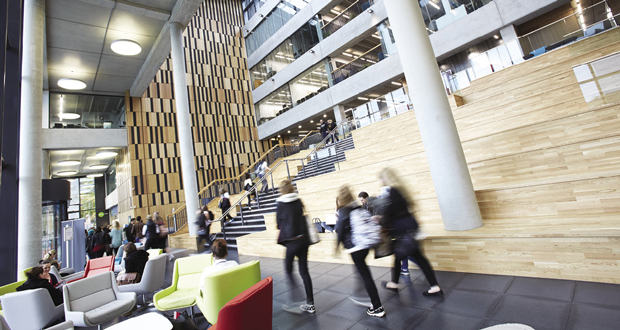FLEXIBLE SERVICE PROVISION
With many facilities management teams facing the challenge of carrying out essential health and safety compliance tasks in unoccupied buildings during the pandemic crisis, EFCD contended with the added challenge of 50 students still living in its accommodation requiring them to ensure that round-the-clock service was being maintained.
To effectively manage service provision, the Student Living team changed its working hours to 8am – 4pm Monday-Friday, with the Security team providing any assistance the residents required outside of these hours.
To minimise the risk of COVID-19 transmission, staff hours were reduced, shift times were staggered, and additional PPE and sanitisation protocols were put in place.
Supported by colleagues from the Business School, the Student Living team set about the task of checking 196 communal areas for health and safety risks – donating non-perishable foodstuffs to a local food bank and safely storing residents’ unclaimed personal property from hastily-vacated rooms so that the cleaning operation could commence.
The team’s Building Maintenance Assistants continued with weekly fire testing water flushing compliance while also conducting ‘check-and-fix’ repairs on the accommodation.
HOUSEKEEPING
In a major setback, all conferencing events were cancelled and the University’s preferred deep-cleaning contractor – who has worked in partnership with MMU on the summer cleaning programme for the previous five years – was unable to attend due to travel restrictions.
This led to a logistical headache for the Student Living’s in-house cleaners, as Residence Manager Robyn Hines explains: “We don’t have enough in-house resource in Student Living to cope with the scale of the cleaning operation. Fortunately, the additional time we have to turn the properties around due to the lockdown, plus the availability of the wider Facilities housekeeping team who were unable to clean their usual academic spaces, meant we could afford to get creative and set a brand-new cleaning schedule with resource we’ve never used before.”
With over fifty housekeepers available to assist, the Residential Services management team had to rapidly decide on a course of action that would enable staff to swiftly adjust to both an unfamiliar site and residential cleaning methods, while stringently observing social distancing measures.
“It was a challenge, but we’re no strangers to dealing with curveballs in student accommodation,” says Assistant Residence Manager for Residential Life & Customer Service, Craig Thompson. “We settled on a plan to induct the Facilities housekeepers with staggered shift allocations, with PPE provided immediately upon arrival to site. Once risk assessments and COSHH safety were communicated, the housekeepers were given coaching sessions on deep-clean best practice in a residential setting.”
Assistant Residence Manager for Property Services Bobby Potter adds: “Our usual contractors supply their own cleaning equipment and consumables; we’ve had to plan ahead and order much more stock than we normally would for a summer cleaning schedule.
“Normally in a 12-bedroom townhouse, there’d be up to 10 cleaners working together to get the job done efficiently. To manage the safety and wellbeing of the team, we had only two housekeepers to a house – one in the ground floor communal area, with the other cleaning the third-floor bedrooms and bathrooms and working their way down over the course of the week. Managers and supervisors coached them on our best practice for deep-cleaning. To keep things moving efficiently, we had multiple cleaners working in multiple properties, rather than the usual concentration of a large team of cleaners covering a couple of properties at a time.”
To avoid fatigue, Facilities housekeepers worked in two-week shift rotations over the lockdown period. The turnover of inductees was challenging for the duty managers and housekeeping supervisor, but the plan bore fruit.
“We’re further ahead with our deep-clean schedule than we thought imaginable at the start of this lockdown,” Hines says. “The key was being flexible with our approach and not coming to a complete halt. If we had stood still and only provided enough staff to support our remaining residents, we would have found ourselves in a very tough place for the summer turnaround, in a logistical sense. But everyone’s flexibility and resilience have meant we’re ahead of schedule and in good shape for the new academic year.”
 WHAT ABOUT THE NEW ACADEMIC YEAR?
WHAT ABOUT THE NEW ACADEMIC YEAR?
While uncertainty is still very much in the air, a combination of EFCD’s quick, innovative response to the crisis and the government’s eased lockdown restrictions has meant the future is looking more promising than initially thought.
A large August conference has proceeded with their booking and some accommodation originally reserved for cancelled conferences is now being used to house NHS placement nurses to support the national fight against the Coronavirus.
Students remain completely undeterred for next year – almost all of the accommodations’ 2,000 rooms have been booked for September 2020.
“It’s been the most unique, challenging year I’ve had in over 15 years in the student accommodation industry,” Hines says. “But like the rest of the country, we’re optimistic about coming out of this challenging time all the stronger for it.”
Cain Smith, is a freelance writer from Manchester with a ‘day job’ as a Property Services Duty Manager at Manchester Metropolitan University.
(ii) https://www.mmu.ac.uk/accommodation/our-halls/
(iii) https://www.mmu.ac.uk/






